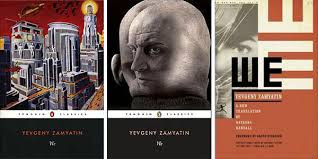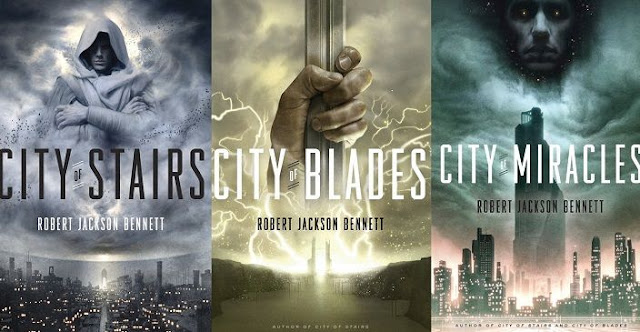We — Yevgeny Zamyatin
"A person is like a novel: you don't know how it will end until the very last page. Otherwise it wouldn't be worth reading to the very end."
—I-330, We
We is a "classic" dystopian fiction written in 1924 by Russian author Yevgeny Zamyatin. Comparable in style to other classic dystopians Brave New World (Aldous Huxley - 1932) and 1984 (George Orwell - 1949), We paints a picture of a possible future that is both wildly beyond imagining and uncomfortably similar to society today.
The Basics:
D-503, Builder of the Integral, is a proud cipher of the One State. He's a mathematician, someone whose mind works in numbers and geometric planes better than words. Regardless, D has decided to keep a record, a true and honest account of his thoughts and experiences. His hope: that when the Integral is completed, his record will be sent out among the stars to explain to other people on new planets what life in the One State is like.In his account, D explains everything about how the One State operates, from the Table of Hours by which ciphers live their lives to the perfect geometry of existence under the rule of the Benefactor. The One State is how the world put itself back together again after the 200-Year War, in which the notion of freedom was suppressed forever so that humanity could finally enjoy complete happiness.
Ciphers live in glass houses in a glass city, with the wild, green, abominably free, and unquestionably dangerous world shut out by their great Wall. Ciphers, as people are called, have letters and numbers for names and live their lives according to the regulation of the perfect order of the Table of Hours. They eat, sleep, work, and mingle according to the Table of Hours—life is orderly and happiness universally enjoyed. According to D-503's record, nothing stands between the One State and total perfection...except the Enemies of Happiness.
The Opinions:
"Disturbance wrought by the Enemies of Happiness, which, naturally, deprives them of the right to become bricks in the foundation of the One State, renewed yesterday. It is clear to each of us that taking their voices into account would be as ridiculous as taking the accidental coughs of sick people in a concert audience as a part of a majestic, heroic symphony."
—State Gazette, We
If you've ever read George Orwell's 1984, you'll notice some stark similarities between that book and We. We tends more toward true sci-fi because the setting's technology is more advanced (D-503 was building a spaceship, after all!), but the basic characters and events of the plots of We and 1984 are practically identical: ordinary man keeps a journal, begins to have revolutionary stirrings, meets a girl who uses her sexuality to stir those feelings, tries to resist totalitarian government, ultimately fails and is converted back to their way of thinking.
That basically sums up the plots of both We and 1984. The entire time I was reading We, I was thinking, "Gee, this sounds a lot like 1984, only longer and even more depressing." Of course, after I finished reading it, I did some research and found out that Orwell actually read and reviewed We a few years before writing his own dystopian novel, so I have to give Zamyatin points for originality since his book actually came first.
But even judging We solely in and of itself (without comparison to 1984, in other words), it didn't strike me as anything spectacular. One struggle for me was that the language was difficult. At 200 pages, We isn't all that long, but it was a struggle to get through. Zamyatin seems to have a thing for long, complicated sentences packed with metaphors. On the one hand, I appreciate the poetry of his writing. Unfortunately, his writing is so dense and compact that I didn't have breathing room between sentences to appreciate poetic turns of phrase. It was hard enough just trying to follow the thread of a single sentence. I'm assuming that had a lot to do with the style of writing in 1920's Soviet Russia, but that didn't make it any easier to read.
And the abstractness of D-503's internal monologue was another problem for me. Half the time the complex and winding way D was thinking boggled my mind to the point where I couldn't follow his train of thought. He was so emotional and emotionally confused (while still determined to logically and mathematically reason everything out) that I just couldn't stick with it. And despite thickets of great metaphors and unique turns of phrase, D never could get beyond the abstract so I never had a concrete thought to latch onto and build off of. Again, I think that had a lot to do with the style of the time as well as the tone Zamyatin wanted for the novel, but it sure made reading tough.
"Why is this dance beautiful? The answer: because it is non-free movement, because the whole profound point of this dance lies precisely in it's absolute, aesthetic subordination, it's perfect non-freedom."
—D-503, We
My feelings about style and language are minor when compared to my opinion about We's female characters however. I can forgive a 1930's novel for old-fashioned language choices, but the view of women in this story touched some sensitive nerves with me. Basically, women had one role in We, and that was to create situations where Zamyatin could talk about sex.
In their own individual ways, I-330 and O-90 (the two female characters in We) have power and influence over D-503. But in the end, their power only comes from their sexuality. I-3300 jolts D-503 out of blind complacency by using her sex appeal to capture and hold his attention. Then sex and intimacy become a weapon she can use to continue to influence him and expand his thinking. O-90 tries to lull him back into acceptance of the overwhelming power and "rightness" of the One State through her maternal desire to have his baby—but again, it's all about the sex.
To be fair, there probably is some aspect of mental stimulation about D's relationship with I-330 that influenced his character arc. Still, as far as I'm concerned, D spent WAY too long being infatuated with lips and pinkness and sex for me to have much respect for any potential intellectual prowess.
Basically, I-330 and O-90 seemed to exist as sex objects, reflecting a bizarre absorption with sex that ciphers seemed to have now that they were supposedly completely happy. I'm not sure whether Zamyatin was trying to make a statement about what happens when you deprive a society of intellectual freedom, or whether he really thought sex was the most interesting thing he could possibly write about. Either way, he spectacularly failed to accomplish anything except push all my buttons and frustrate me. Luckily, everything was already so abstract and confusing that I only had a vague idea of what was happening, otherwise I probably would have quit.
"You are confronting unknown creatures on alien planets, who may still be living in the savage state of Freedom, and subjecting them to the beneficial yoke of Reason. If they won't understand that we bring them mathematically infallable happiness, it will be our duty to force them to be happy. But before resorting to arms, we will employ the Word."
—State Gazette, We
The Verdict: 2 stars
As you can probably tell, I wasn't too impressed with We. As a depressing prediction of where society might be headed, I didn't expect to enjoy it, per se, but I had hoped for a stimulating and thought-provoking perspective on humanity. Instead, I got a sad little novel that buried any powerful thematic message it might have carried deep within difficult, meandering sentences until I couldn't find it. I'm sure literary critics somewhere got something meaningful of out We that has preserved it as a "classic" 95 years after it was published, but its certainly not a book I plan to read again.I wouldn't recommend it unless you're simply interesting in finding out what it says—certainly don't go to it for entertainment purposes. My suggested reading ages are 18 on up, simply for comprehension and because of the overall content. It's not an especially vulgar book, but it's on the adult side of sexual content (according to my scale).




Comments
Post a Comment